I am working on an article for the newsletter of the Secular Franciscan region that I belong to. Originally, I had intended to write about climate change, but in light of the pandemic, I have decided to write about something more current. This blog post is a first draft. I am very much interested in feedback, both regarding my argument based on Catholic social teaching, and on the rhetorical structure of the argument.
The Covid-19 pandemic is now approaching the one year anniversary of the first reports from China of a novel coronavirus outbreak in the city of Wuhan. Since then the disease has swept the globe: as I am writing this post, there have been over 81 million cases worldwide, resulting in almost 1.8 million deaths, including over 335,000 deaths in the United States. (Data retrieved from Johns Hopkins on 12/28/2020.) Every nation has been affected, often with terrible consequences for the economy, especially for the lives of the poor and marginalized.
The one bright hope is the development and release of vaccines. In the United States, both the Pfizer and Moderna vaccines have been approved by the FDA, and distribution has begun. Almost 2 million people have been vaccinated, and hundreds of millions of doses are going to be produced. While it will take time–at least six months or more–to reach the levels of vaccination required to bring the disease under control and allow us to relax masking and social distancing protocols, there is good reason to be optimistic.
However, this optimism requires that the vaccine be used, and there are grounds to be concerned. In a recent poll, 40% of people responded that they definitely or probably would not get the vaccine when it became available. For the vaccine to be effective, the vaccination rate should be at least 75-80%, according to Dr. Anthony Fauci. (By comparison, for measles, a target vaccination rate is over 90%.) Therefore, vaccination rates in the US will have to be considerably higher for life to begin to return to something resembling “normal.”
People have expressed a number of reasons for not being vaccinated. Some (hopefully small) percentage subscribe to outlandish conspiracy theories regarding the vaccination: for instance, that it is part of a world-wide plot to inject microchips into the world’s population. Others, influenced by the anti-vaccination movement in the US, believe that the vaccinations are unsafe, sometimes pointing to the speed with which they were developed as a reason for concern. Among Catholics there is a concern that the vaccines are unethical, having been developed or tested with cell lines derived from an aborted fetus, and therefore should not be used. This argument is being advanced by a number of conservative Catholic voices on social media, including a handful of bishops (see the statements by Bishop Joseph Strickland and Bishop Athanasius Schneider). However, their arguments misstate Catholic ethical teaching, and both the Vatican and the US Conference of Catholic Bishops have issued categorical statements on the morality of using existing vaccines. For a good summary of the issues involved, see the articles by Vox Nova blogger Brett Salkeld, theologian for the Diocese of Sasketchewan, and Catholic ethicist and Legionary priest Matthew Schneider.
These moral questions are important, but I believe that the Church has resolved them. I want to consider the related question: since it is morally acceptable to receive one of the new vaccines, is it your moral duty to receive one? The Vatican statement directly addressed this issue, saying:
At the same time, practical reason makes evident that vaccination is not, as a rule, a moral obligation and that, therefore, it must be voluntary. In any case, from the ethical point of view, the morality of vaccination depends not only on the duty to protect one’s own health, but also on the duty to pursue the common good. In the absence of other means to stop or even prevent the epidemic, the common good may recommend vaccination, especially to protect the weakest and most exposed. Those who, however, for reasons of conscience, refuse vaccines produced with cell lines from aborted fetuses, must do their utmost to avoid, by other prophylactic means and appropriate behavior, becoming vehicles for the transmission of the infectious agent. In particular, they must avoid any risk to the health of those who cannot be vaccinated for medical or other reasons, and who are the most vulnerable. (Emphasis added.)
The text says that vaccination is “voluntary”, but this is not a free pass to avoid vaccination. The text goes on to link vaccination with the concept of duties, a key component of Catholic teaching on human rights. Pope John XXIII introduced this concept, which seems to be unique to Catholic thought, in his encyclical Pacem in Terris. Every human right is paired with a reciprocal duty:
The natural rights of which We have so far been speaking are inextricably bound up with as many duties, all applying to one and the same person….[I]t follows that in human society one man’s natural right gives rise to a corresponding duty in other men; the duty, that is, of recognizing and respecting that right. Every basic human right draws its authoritative force from the natural law, which confers it and attaches to it its respective duty. Hence, to claim one’s rights and ignore one’s duties, or only half fulfill them, is like building a house with one hand and tearing it down with the other. (Pacem in Terris, 28, 30)
In other words, if a person has a right, then others automatically have a duty to make that right a reality. Moreover, it follows that the more important this right is, the more compelling the obligation to support that right. Proclaiming a right, without accepting this duty, is a significant failing. As the letter of St. James put it,
If a brother or sister has nothing to wear and has no food for the day, and one of you says to them, “Go in peace, keep warm, and eat well,” but you do not give them the necessities of the body, what good is it? So also faith of itself, if it does not have works, is dead. (James, 2:15-17, NABRE)
The text bases the morality of getting vaccinated on the right to life and on the promotion of the common good. The common good is inextricably linked to the right to life, as this is not simply the right to an individual, biological existence, but rather the right to live in a community that protects and promotes human life and dignity:
Man has the right to live. He has the right to bodily integrity and to the means necessary for the proper development of life, particularly food, clothing, shelter, medical care, rest, and, finally, the necessary social services. In consequence, he has the right to be looked after in the event of ill health; disability stemming from his work; widowhood; old age; enforced unemployment; or whenever through no fault of his own he is deprived of the means of livelihood. (Pacem in Terris, 11)
For Secular Franciscans, this duty to the common good is expressed in our rule:
Especially in the field of public life, they should make definite choices in harmony with their faith. (OFS Rule, Chapter 15)
A vaccination against a pandemic diseases that has killed millions is critical health care. Moreover, it is not simply for the protection of the individual. A vaccination campaign works primarily on a community, by preventing the transmission of the disease. In the short and medium term it protects individuals, both those who are vaccinated, and, equally importantly, people who for health reasons cannot be vaccinated. In the long run, a vaccine can be used to eliminate a disease from a community: think of smallpox which no longer exists, or polio, which now exists in only a small handful of countries.
Being vaccinated is not simply a matter of personal health care, but a fundamental part of a coordinated plan to provide health care, and so protect the life and health of others. It would, therefore, appear to be a duty, and a pressing one, corresponding to the right to life. The Vatican statement says that actually being vaccinated is not obligatory, but the duty to protect the right to life and uphold the common good is. In particular, anyone who refuses to be vaccinated “must do their utmost” to not transmit the disease to others. This means adhering to strict masking and social distancing protocols for months, perhaps even a year or more, until the rate of vaccination in their community exceeds the desire threshold, and their are no longer any known cases of community transmission. Moreover, since they are not vaccinated, they must be prepared to resume these practices if there is another outbreak in their community.
I would argue that while being vaccinated is not obligatory, it should be the rule and not the exception. For anyone considering not getting vaccinated, I would ask these questions:
- Do you have a health condition that prevents you from getting any vaccinations? To the best of my knowledge, these are limited to people with known allergies to vaccine ingredients, and to people who are immuno-compromised.
- If you have safety concerns, are they based on reliable sources, such as the CDC or FDA, or are they just generalized fears or prompted by claims made on social media? Decisions of this magnitude should be based on the best available information, and not on anecdotes or speculation.
- If you have moral concerns that the vaccine makes you morally complicit in the evil of abortion, have you weighed this against the many other evils in the modern world that you are also complicit in?
- If you are not going to get vaccinated, are you willing to accept the responsibility of wearing a mask and socially distancing in public for many months?
Featured image: Army Cpt. Isaiah Horton, a doctor at Walter Reed National Military Medical Center, receives a COVID-19 vaccination, Walter Reed National Military Medical Center, Bethesda, Md., Dec. 14, 2020. (DoD photo by Lisa Ferdinando). Used with permission from Wikimedia Commons.
Updated 02/02/21 to change link for Brett Salkeld’s article to our blog.













